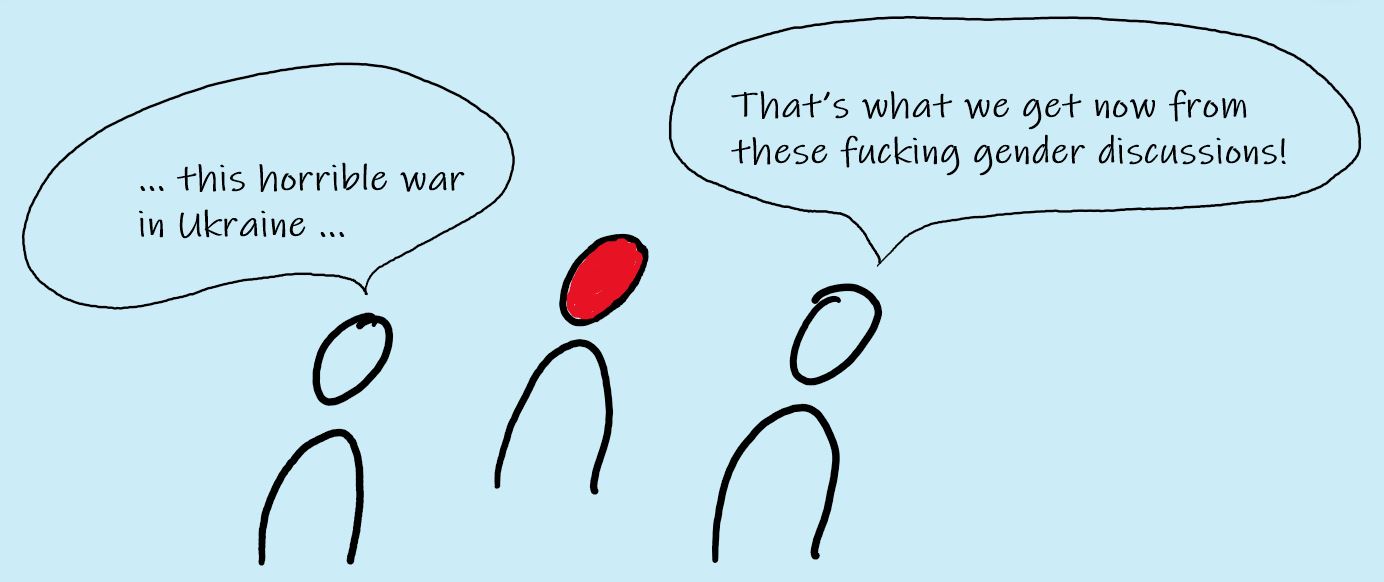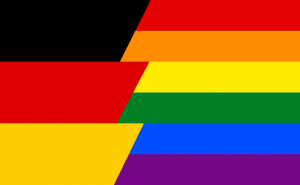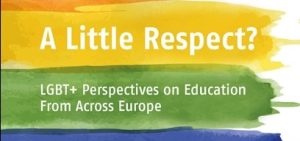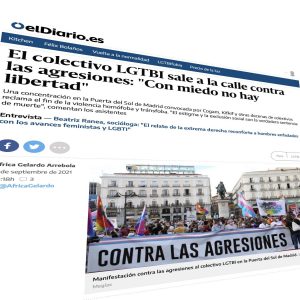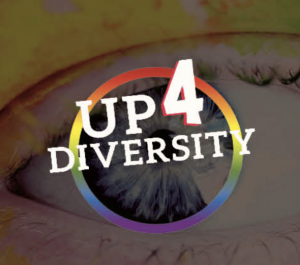The German “gender gaga discussion” and the invasion of Ukraine
Recently, I heard my neighbours talk about the horrible war in Ukraine. One of them pointed out: “That’s what we get now from these fucking gender discussions!” Caught off guard, I was completely speechless and unable to react. Two days later I read on a queer web portal that several German newspapers proclaimed Germany’s “weakness” towards the Russian regime was rooted in the “feminisation of the army” and the “gender gaga discussion”.
[Content warning: there is some irony in the following.]
Oh yes, we have to acknowledge an enormous degree of “feminisation”, since there have been women in the German Bundeswehr for about 20 years (by comparison: more than three times as much in the US Army); they now make up almost 13% of the armed forces, and there are soldiers and officers like Lieutenant Colonel Anastasia Biefang, who identifies as trans*. I am pretty sure this bunch of women with PMS discussing tampon dispensers in the toilets is what convinced Putin to invade the Ukraine…
So what is meant by the “gender gaga discussion”? Various newspapers and political parties have used this term to create sentiment against minorities for many years. They proclaim the “natural order of man and women, (heterosexual) marriage and family” is threatened by the use of a tiny asterisk defacing the German language. At this point, it is important to know that the German language differentiates between male and female designations in nearly every domain: we don’t have teachers, we have “Lehrer” and “Lehrerinnen”. We don’t have pupils, but “Schüler” and “Schülerinnen”. We don’t have doctors, we have “Ärzte” and “Ärztinnen”. Usually, the male designation is used as the generic or “inclusive” term. Because, unfortunately, we haven’t reached gender equality especially in the professional arena (legally, we do have gender equality, of course, but the reality is a different thing), feminists have long asked to refer to both genders by using both masculine and feminine nouns — or to use only the feminine. The latter is unthinkable of course, and the former so wearisome. And now, to make matters worse, there are also those who want to soften the natural binary gender construct and demand the use of a gender star, which would lead to “Lehrer*innen”, “Schüler*innen” and “Ärzt*innen”! You would think that would be a great solution since it is both inclusive and economical. You already guessed: of course not. Firstly, looking at a word so disfigured is an insult. Secondly, it is impossible to pronounce such words — the flow of speech would be disturbed. (Note for non-German speakers: the “*” in a word means a very short break in speech. The German language knows some other words which request this kind of spelling, e.g. the word “Spiegelei” [fried egg]).
That is why I am quite sure that the “gender gaga discussion” is only superficially concerned about the German language, which, like all other languages, has changed and keeps changing over time anyway. It is more to do with the “threat to the natural order of men and women” — but what does that mean? I am a biologist; therefore, I take a look at what current biological research has to say. Human sex is defined by three criteria: chromosomes, hormone-producing tissues, and internal and external genitals. All three occur (naturally!) in various forms. That is why biology describes sex as a continuum with two extremes, male and female. The forms between these extremes are called inter*.
What about the term “gender”? Judith Butler describes it as a social construct: we were not born as girls or boys — we were made girls or boys by being raised within (human-made) social norms. People who reject gender-specific attributions, who cannot or do not want to identify with them, describe themselves as gender-nonconforming, genderfluid or non-binary. Others describe gender as a part of a person’s identity, as self-perception. If this self-perception does not match external perceptions (which are usually formed by social norms), the term trans* is used in opposition to the term cis, in accordance with self- and external perception.
Ultimately, “discussion” of sex and gender threatens one thing: the “natural” power gap between privileged and less privileged. (To put it in Carolin Emcke’s words, if you conform to the norm, you can afford to deny its existence.)
And what is war, but the violent exertion of power by privileged Machiavellians against less privileged and/or minorities?
Now that I’ve finished writing this post, I will bring these arguments and have a cup of coffee at my neighbours’.

This post created by the German team of Franziska and Birgit — vielen Dank!

